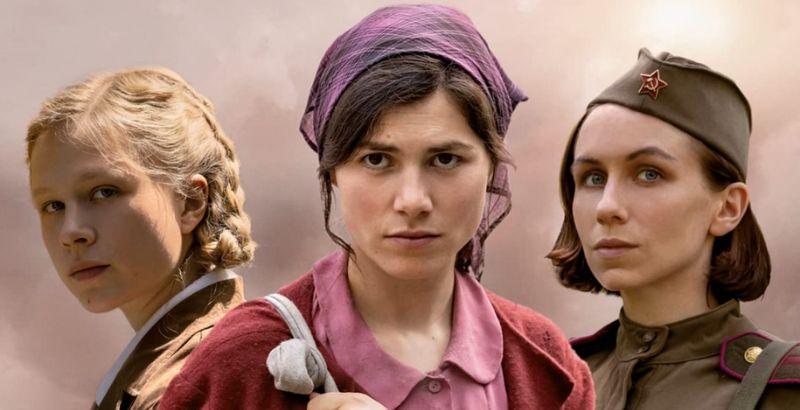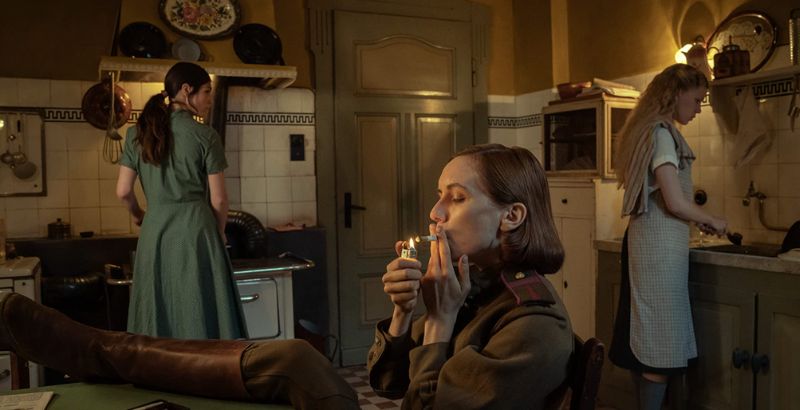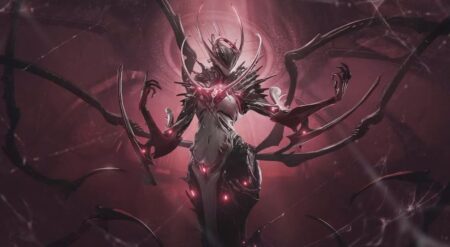
The debate over who should depict Jewish stories and characters and how those stories ought to be depicted is eternal. The question of representation is begged once again by way of Dutch filmmaker Saskia Diesing’s upcoming film Lost Transport, which explores a true, forgotten moment in post-Holocaust history through a fictional set of characters.
But Why Tho sat down with one of the stars of Lost Transport, Hanna van Vliet, a non-Jewish actor who plays the movie’s main Jewish character, Simone. Van Vliet shared with But Why Tho her stances as a queer woman on representation on and off-screen and the process of making a Holocaust-era movie as a non-Jewish actor. She also shares why she sees Lost Transport as important, aspirational cinema, even while some aspects might seem fantastical.
Lost Transport is a work of fiction about a real-life train abandoned by the Nazis near the German town of Tröbitz in 1945. The train was transporting Jewish prisoners from Bergen-Belsen to Theresienstadt just as WWII was ending. Members of the Russian army helped the Jews occupy the German town as they endured typhoid and awaited further instructions from Moscow.
While the lost transport was real, carrying its most well-known survivor Hannah Gosler, the movie’s story of Jewish survivor Simone, Russian soldier Vera (Eugénie Anselin), and German townsperson Winnie (Anna Bachmann) is fictional. As van Vliet explained to But Why Tho, writer and director Diesing often says, “Men make war, and women have to clean up.” Lost Transport is a movie that wonders how women of three drastically different experiences might have treated each other during WWII.
Van Vliet describes women’s stories from the WWII era as being buried by the men who chiefly wrote the period’s history. Diesing’s “fascination is compassion,” as van Vliet describes it. Lost Transport takes three women from three different experiences with the war–three different allegiances and three different languages–puts them together in a confined and precarious space and attempts to find out whether compassion is possible between them or even warranted.
“Why the f*ck should she look beyond the hate of a German Nazi girl?” van Vliet put it bluntly about her own Jewish character, Simone. “I could perfectly understand if Simone said f**k you all to Vera and Winnie, took Winnie’s house, and that was the movie.” She can empathize with Winnie, too, though. As a viewer, you don’t know how aware she might claim to have been about the death camps or how she felt about them. You only know that Russian soldiers killed Winnie’s mother and took her house away from her to give it to a refugee she was raised to hate.
In Lost Transport, the three women at its center commit atrocities toward one another, but they also save one another’s lives. It’s war. It’s a time of utter chaos, tragedy, confusion, and desperation. The three characters endeavor a complicated and nuanced relationship that, while perhaps imperfect and fantastical, is intentional in its choice to be positive rather than dismal.
“For [Lost Transport writer and director] Diesing, it was important to see women behave differently around such things as war [compared to the men we typically watch],” explains van Vliet. “I think we live in a time where everything is polarized and getting worse. The movie is about trying to be empathetic during a war—connecting with and not giving up on people.”

Van Vliet isn’t naive about how people might respond to a Holocaust-era movie with a positive message. She’s well aware that some might watch this movie and hate that it isn’t a documentary or social-realistic drama. But its story, its characters, and its heart come from ten years spent by Diesing researching the stories of the Lost Transport’s survivors. This includes her own uncle, whose funeral eulogies inspired her initial interest in this lost piece of history. The movie was developed after meeting with survivors and their relatives, as well as being heavily influenced by the diary of Renata Laquer, whose relatable sarcasm and witty prose about her time in Bergen Belsen felt deeply relatable to van Vliet and the rest of the cast as they researched and discussed their roles together.
The fact that van Vliet is a non-Jewish actor playing a leading Jewish character is not lost on van Vliet. As an actor and the creator of an excellent original series and Netflix movie, Anne+, one of van Vliet’s rules of thumb is that straight actors should generally stick to straight roles and leave room for queer actors to play authentic parts. Especially when the straight actors are more famous or privileged “because gay actors still face discrimination and are often not even invited to cast for straight parts.” But, she also believes an essential part of acting and filmmaking is imagination. If actors can’t play parts outside of their experiences, within reason, then imagination is being stifled, according to van Vliet.
This is where van Vliet, who also plays the famous lesbian and Dutch resistance fighter Frieda Belifsnte in National Geographic’s upcoming series A Small Light, struggled personally over her decision to play a Jewish character as a non-Jewish actor. “I have been thinking a lot about what it means—and if it means anything—that I took on this part. At some point, I even wondered if I should have declined,” van Vliet admitted to But Why Tho. “I met people with Dutch-Jewish ancestors whose grandparents or family were on the train. I know it can be hard to watch the film when you’re so close to the subject.” She recognizes that people want to see their own or their family’s stories told authentically and accurately.
However, she also adds that as an early-career actor, she was hardly in the position to turn down a starring role in a major movie. Working on Lost Transport offered a different kind of opportunity for under-represented on-screen representation. “The film centers around three layered female characters, which is amazing and rare, and something that I’ve been craving in our industry,” van Vliet shared with But Why Tho.
Ultimately, van Vliet is appreciative that the role imagines women’s perspectives from a time from which little documentation of these perspectives remains. Meanwhile, van Vliet is also excited that Lost Transport will allow audience members to connect with this moment in Jewish history.
“I’m from Holland. Terrible things happened during the war where I’m sitting, here in Amsterdam. The war and the Jewish community are a big part of what we learn here as children in schools. I’ve been to Auschwitz twice.” The Jewish history of the Holocaust and the Netherlands are important to van Vliet. But she also sees Lost Transport as more than just a Jewish movie–because it is. The Jewish perspective is just one aspect of the larger pan-European experience being centered.

For van Vliet, the foremost answer to the question of representation in film and why she wanted to be a part of it comes down to empathy. For her, Lost Transport is a movie, above all, representing the idea that empathy must be part of the solution to hate–“whether it’s anti-queer hate or anti-Jewish hate.”
Lost Transport is a strong film and aspirational fantasy of empathy and connection as resistance against the world’s most abominable, hateful forces. The world is still full of Nazis, and Lost Transport makes zero implication that we should empathize with any of them. As van Vliet put it, “I do believe film can change our perspective. [Lost Transport] is about connection and the importance of not giving up on people. Which I think is a very noble thing to strive for in life.”






